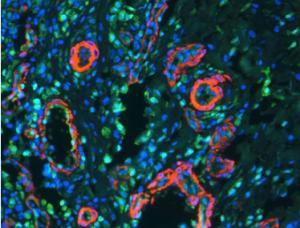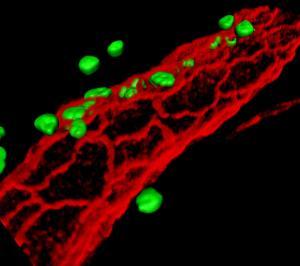Vascular Inflammation and Cell Trafficking
 CiTI team leaders are involved in pioneering research investigating inflammatory processes, with international leadership on the mechanisms that regulate tissue-specific cell trafficking as well as mechanisms that incite resolution of inflammation. It is envisaged that thorough investigation of these processes, innovative and targeted drug discovery strategies could be identified.
CiTI team leaders are involved in pioneering research investigating inflammatory processes, with international leadership on the mechanisms that regulate tissue-specific cell trafficking as well as mechanisms that incite resolution of inflammation. It is envisaged that thorough investigation of these processes, innovative and targeted drug discovery strategies could be identified.
Prof Perretti and colleagues (Junior Faculty; Dr Cooper, Dr Norling and Dr Montero-Melendez) have established the concept that acute inflammation resolves by the engagement of endogenous mediators that activate a series of non-redundant processes (inhibition of immune cell trafficking, efferocytosis and tissue repair) typical of what we now call the Resolution of Inflammation. When resolution is malfunctioning it contributes to chronic inflammatory diseases. Prof Perretti’s lab studies the pathophysiology of pro-resolving pathways and aims to exploit the molecular pharmacology of their receptors for the development of innovative anti-inflammatory therapeutics.

Prof Nourshargh (Wellcome Trust Senior Investigator) and members of her Centre (Principal Investigators: Dr Voisin, Dr Nightingale and Dr Whiteford) are collectively elucidating the cellular and molecular mechanisms that mediate immune cell trafficking, vascular permeability and angiogenesis. In addition the Centre has world-leading expertise in chemokine biology (Prof Rot, Wellcome Trust Investigator) and stem cell therapy for treatment of heart diseases (Prof Suzuki). The team has made fundamental discoveries and advancements in regulation of inflammatory disorders, such as the (i) identification of retrograde migration of neutrophils through venular walls as a novel paradigm in how a local acute inflammatory insult can become systemic, (ii) identification of novel immunological roles for the atypical chemokine receptor 1 such as regulation of hematopoiesis, and (iii) development of novel strategies for delivery of adult stem cells to injured hearts.
Within the immunology field, Prof Marelli-Berg and her team (Junior Faculty: Dr Longhi, Dr Nadkarni and Dr Mauro) have recently described the molecular pathway mediating T cell cardiotropism and shown that inhibition of this pathway results in heart-selective immunosuppression. Her Gates Grand Challenge Exploration Award brings the opportunity to develop new organ-selective vaccines. Recipient of the BHF Chair of Cardiovascular Immunology, Prof Marelli-Berg is currently investigating the metabolic pathways fuelling T-lymphocyte migration and her team recently reported that aerobic glycolysis is essential for T-cell motility, which can be modulated by glycolysis end products in inflammatory conditions.
Dr Dalli’s Lab is interested in accelerating the resolution of joint inflammation and the regeneration of damaged tissues. Inflammatory arthritis is characterised by uncontrolled joint inflammation resulting in damaged bones and cartilage. Current therapies are aimed at controlling the inflammatory component, however they do not promote the repair and regeneration of damaged tissues. Dr Dalli’s team has recently identified two novel families of endogenous mediators produced by leukocytes during self-limited inflammation, and is interested in identifying the mechanisms that these mediators activate to promote the resolution of joint inflammation and joint regeneration. He directs the QMUL Lipid Mediator Unit.


